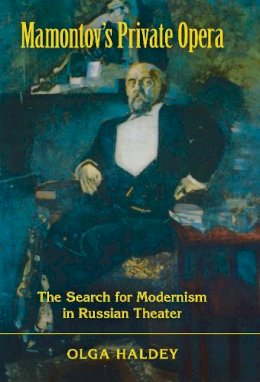Olga Haldey is Assistant Professor of Musicology at the University of Maryland, College Park.
"The end of the 19th century in Russia saw a great flourishing of arts, owed in large measure to the philanthropy of entrepreneurs who had profited from expanded opportunities in railroads, textiles, and other businesses. Savva Mamontov's patronage of the Abramstevo artists' colony and Moscow Private Opera is well known, but his own gifts and his continuing influence awaited recognition. This exhaustive, trailblazing study gives him that recognition. Haldey (musicology, Univ. of Maryland, College Park) scoured Russian archives for original correspondence and other records that demonstrate how much Serge Diaghilev, Konstantin Stanislavsky, and even Vsevolod Meyerhold owed to Mamontov. She explores Mamontov's place in the aesthetic debates of Russia's Silver Age, his relationships with singers and composers, and his focus on the dramatic and the visual elements in his landmark opera productions, which seriously challenged those of the Bolshoi. . . . With extensive notes and 40 halftone photographs, this is an important work for Russian and turn-of-the-century cultural studies. Summing Up: Highly recommended. Upper-division undergraduates through faculty; general readers. — Choice"—F. H. Londré, University of Missouri-Kansas City, March 2011 "This is a valuable and long overdue work that enriches an ignored but greatly influential artistic enterprise drawn from the era's greatest artistic figures, and sponsored and set together in dynamic collaborations by the ingenuity and tastes of Savva Mamontov."—Sineris "Haldey has performed a crucial service to scholarship and to everyone interested in this fascinating period.V.70.3 July 2011"—The Russian Review "Haldey, a musicologist at the University of Maryland, provides a close-up of what, remarkably, [Mamontov] accomplished and how and why. . . . [S]he manages to evoke successfully a larger than life man and his era. August 22, 2010"—The Reporter-Times "With extensive notes and 40 halftone photographs, this is an important work for Russian and turn-of-the-century cultural studies. Highly recommended.March 2011"—Choice "This fine, rigorously researched book should please anyone interested in the development of the arts in Russia. Opera NewsMarch 1, 2011"—Opera News "Haldey gives an evocative and detailed portrait of the era, drawing on letters, memoirs, contemporary criticism and reviews, and synthesizing important secondary literature in a variety of related fields . . . [This] should be required reading for all historians of Russian theatre."—Slavonic and East European Review "Hadley's research provides an effective reclaiming of the important . . . role played by Savva Mamontov and the MPO in the history of modernist theater in Russia. It should attract the interest of musicologists, visual art and theater historians, as well as social and cultural historians interested in the development of artistic modernism in late imperial Russia."—H-Russia "Haldey's fresh account of Mamontov's vital role in the creation of the modern Russian theater is striking for its originality, the depth of its research and analysis, and the detail it provides."—Slavic and East European Journal "Haldey deserves great credit for re-creating this lost world of art for its own sake and restoring it to its proper place in the pages of Russian history."—Revolutionary Russia "[Haldey's] book will change our understanding of Russian opera in the 'Silver Age.' It is the necessary—and overdue—complement to Braun's 1999 study, whose focus is on the Mariinsky Theater in St. Petersburg. . . .67.4 June 2011"—Notes "Mamontov's Private Opera is a fascinating and detailed presentation—using existing primary source materials—of the power and influence that one man had on both Russian music history and international music history at the turn of the twentieth century."—Music Reference Services Quarterly "This is a bracing account of a time when faith in dramatic art was contagious—and worked wonders."—Slavic Review "[Haldey's] research will be appreciated not only by historians of Russian music and theater, but also by readers interested in Russian culture of the Silver Age."—Malcolm Hamrick Brown, Indiana University "Interdisciplinary in the most thorough-going way."—David Haas, Univeristy of Georgia

